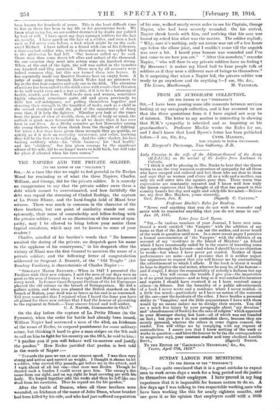FROM AN AUTOGRAPH- COLLECTION: [To vim EDITOR OF TER "
SPECTATOR:1 have been passing some idle moments between services looking at my autograph collection, and it has occurred to me that the three quotations from it I have copied out may be of interest. The letter to my mother is-interesting in' showing that H.M.'s sympathy is inherited and as inquiring as his grandmother's. Professor Blackie wrote the Rules for me, and I don't know that Lord Byron's letter has been published
late Cluvlato to Ibdion. Government.
St. Margaret's Parsonage, New Galloway, N.B., Lady Canning to the wife of the Adjutant-General of the Army (H.E.I.C.S.) on the arrival of the Ladies from Lucknow in Calcutta.
"I think it will be pleasing to Mrs.- Banks to hear that the Queen writes to methe very warmest:expressions of sympathy for all those who have escaped and suffered and lost those who are dear to them and says that as woman and above all as a wife and_a mother, can only too well enter into the agonies gone thro. These -warm true expressions are constantly repeated. and know- well how truly the Queen expresses that the thought of all that ,has passed in this country haunts her day and night and solely fills her mind.—Believe me, my dear Mrs. Mayhew, yours sincerely,
- Professor Blackie's Rules for Reading.
"Never read' anything that you do -not wish to- remember and .never wish to remember anything that you-do not mean to use." Jan 20,.1887.
Letter from Lord Byron.
"Sts,—In various numbers of your Journal, I have seen men.
tioned a work entitled 'the Vampire ' with the addition of my Iname as that of the Author. I am not the author, and never heard of the work in question until now. In a more recent paper I perceive a formal announciation of the Vampire' with the addition of an account of my ' residence in the Island of Mitylene ' an Island which I have occasionally sailed .by in the course of travelling some 'ears ago through the Levant—and where I should have no objection to reside—but where I have never yet resided- Neither of these performances are mine—and I presume that it is neither. unjust nor ungracious to request that you will favour me by contradicting the advertisement to which I allude. If the-book is clever it would be base todeprive the real writer, whoever he maybe, of hislonour--- ,and if stupid, I desire the responsibility, of nobody's dullness but my own. . . . You will excuse the trouble r give you—the imputation is of no great .importance—and as long as it was confined'to surmises ,and reports I should- have received. it as I have- received many
„others—in Silence. But the formality of a public advertisement
of a book I never wrote and a residence where I never.resided—is 'a little too- much—particularly ash have no notion of the contenth =of the one—nor the incidents of the other. I have besides -a personal :dislike to Vampires,' and the little acquaintanoe.I have with them _would by no means induce me to. divulge-their secrets. You. did 'me a much less injury by your paragraphs about my devotion' and `abandonment of Seteietyfor the sake of-religion' 'which appeared to your Messenger during last Lent--all of which was not founded :on fact.;_ but you-see:I do,not contradict- them, because they are ;merely, personal, whereas the others in some degree.. concern the reader. You will oblige me by complying with- my, request. of, contradiction. I assure you that I know nothing -of the work or works in question—anditavethehonour to- be (as the correspondents to magazines say);_.your eonatant'inader andlvery obedient humble
To THE EDITOR OF GALIGRANI'S MESSENGER:, &C., &O.-
. Venice, April'27th, 1819."


































 Previous page
Previous page